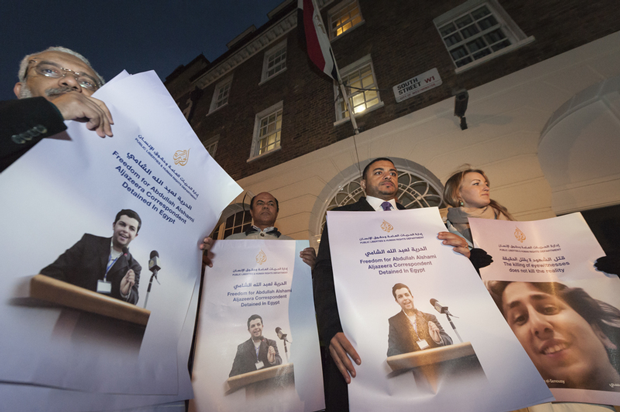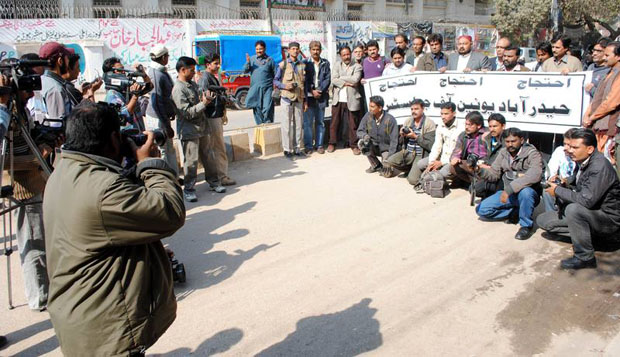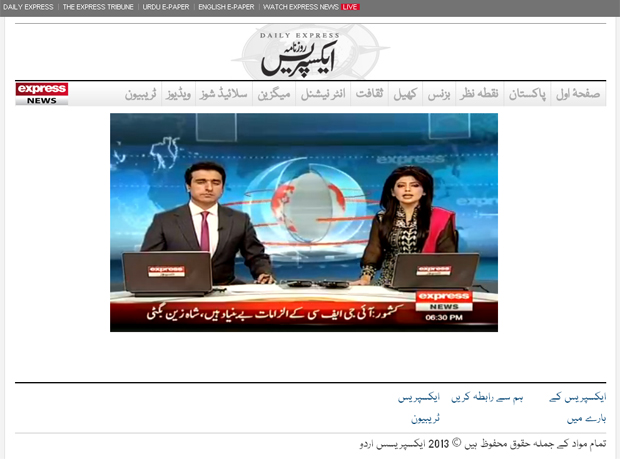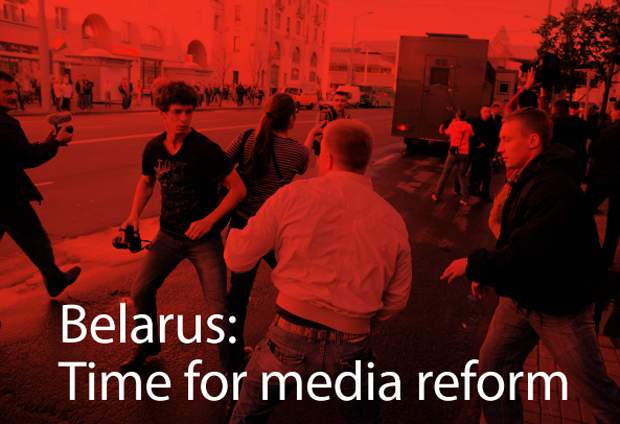6 Feb 2014 | Belarus, Campaigns, Index Reports
In a new policy paper, launched today in Minsk, Index on Censorship calls for the much-needed reforms of the media field in Belarus.
Belarus continues to have one of the most restrictive and hostile media environments in Europe. Recent years have brought no genuine improvements to the media situation. In a country that has not held a free and fair election since 1994 the authorities keep tight control over the media as a means of preserving their power.
The new report Belarus: Time for media reform says the country’s media market is strictly controlled by the Belarusian government. That control rigs the media market to benefit state-owned providers and impedes the development of independent print and television outlets through legislative and administrative restrictions. The state-owned media enjoys significant budget subsidies, favourable advertising and distribution contracts with government agencies. In comparison, independent publications face economic discrimination and distribution restrictions.
The police use violence and detain journalists, especially those who cover protests.
8 February 2014 will mark the 5th anniversary of the current media law in Belarus. Restrictive media legislation and its oppressive implementation have made the media landscape unfavourable for freedom of expression.
Andrei Bastunets, a vice chairperson of the Belarusian Association of Journalists, and a co-author of the report, said:
“The media law in Belarus fails to foster the development of pluralistic and independent news media through a complicated procedure of compulsory registration of new media outlets and possibilities for the state to close down existing media even for minor infringements. The authorities clearly look into expanding the restrictive regulation to online news media.”
Despite ongoing pressure by international community and Belarusian civil society, the authorities of the country have been quite reluctant to discuss or implement recommendations on media legislation or changes in practices of their implementation to bring them in line with international standards.
Andrei Aliaksandrau, Index Belarus Programme Officer, said:
“We urge the Belarusian authorities to immediately remove all contraventions of human rights and media freedom. The much-needed reforms of the media field should be launched in order to end harassment and persecution of journalists, and eliminate excessive state interference in media freedom. The outline of these reforms should result from a dialogue with professional community and civil society of the country.”
Read the full text of the policy paper “Belarus: Time for media reform” here.
Поўны тэкст аналітычнага дакладу “За рэформы медыя ў Беларусі” можна пабачыць тут.
31 Jan 2014 | Egypt, News

In November 2013, the National Union of Journalists (NUJ UK and Ireland), the International Federation of Journalists (IFJ) and the Aljazeera Media Network organised a show of solidarity for the journalists who have been detained, injured or killed in Egypt. (Photo: Lee Thomas / Demotix)
Statement: Egyptian authorities must stop their attacks on media freedom from Article 19, the Committee to Project Journalists, Index on Censorship and Reporters Without Borders
Twenty journalists working for the Al Jazeera TV network will stand trial in Egypt on charges of spreading false news that harms national security and assisting or joining a terrorist cell.
Sixteen of the defendants are Egyptian nationals while four are foreigners: a Dutch national, two Britons and Australian Peter Greste, a former BBC Correspondent. The chief prosecutor’s office released a statement on Wednesday saying that several of the defendants were already in custody; the rest will be tried in absentia.The names of the defendants, however, were not revealed. The case marks the first time journalists in Egypt have faced trial on terrorism-related charges, drawing condemnation from rights groups and fueling fears of a worsening crackdown on press freedom in Egypt .
“This is an insult to the law,” said Gamal Eid, a rights lawyer and head of the Arab Network for Human Rights Information. “If there is justice in Egypt , courts would not be used to settle political scores”, he added.
In December, the government designated the Muslim Brotherhood as a terrorist organization. It has since widened its heavy-handed crackdown on Brotherhood supporters, targeting pro-democracy activists, journalists and anyone considered remotely sympathetic to the outlawed Islamist group.
In a move seen by rights advocates as a blow to freedom of expression, most Islamist channels were shut down by the Egyptian authorities almost immediately after Islamist President Mohamed Morsi was toppled in July. The Qatar-based Al-Jazeera is one of the few remaining networks perceived by the authorities as sympathetic to Morsi and the Brotherhood.
Once praised by Egyptians as the “voice of the people” for its coverage before and during the 2011 mass protests that led to the removal of autocrat Hosni Mubarak from power, Al Jazeera has since seen its popularity dwindle in Egypt. Since Morsi’s ouster by military-backed protests in July, Qatar has been the target of media and popular wrath because of its backing for the Brotherhood. Allegations by the state controlled and private pro-government media that Qatar was”plotting to undermine Egypt’s stability” has inflamed public anger against the Qatar-funded network, prompting physical and verbal attacks by Egyptians on the streets on journalists suspected of working for Al Jazeera.
The Al Jazeera Arabic service and its Egyptian affiliate Mubasher Misr were the initial targets of a government crackdown on the network and have had their offices ransacked by security forces a number of times. In recent months however, the crackdown on the network has escalated, targeting journalists working for the Al Jazeera English service as well despite a general perception among Egyptians that the latter is “more balanced and fair” in its coverage of the political crisis in Egypt.
The Al Jazeera network has denied any biases on its part and has repeatedly called on Egypt to release its detained staff. According to a statement released by Al Jazeera on Wednesday, the allegations made by Egypt’s chief prosecutor against its journalists are “absurd, baseless and false.”
“This is a challenge to free speech, to the right of journalists to report on all aspects of events, and to the right of people to know what is going on.” the statement said.
Three members of an Al Jazeera English (AJE) TV crew were arrested in a December police raid on their makeshift studio in a Cairo luxury hotel and have remained in custody for a month without charge. Both Canadian-Egyptian journalist Mohamed Fahmy — the channel’s bureau chief –and producer Baher Mohamed have been kept in solitary confinement in the Scorpion high security prison reserved for suspected terrorists and dangerous criminals. An investigator in the case who spoke on condition of anonymity because he was not authorized to speak to the press said Fahmy was an alleged member of a terror group and had been fabricating news to tarnish Egypt’s image abroad.
Earlier this week, Fahmy’s brother, Sherif, complained that treatment of his brother had taken a turn for the worse and that prison guards had taken away his watch, blanket and writing materials.
Peter Greste, the only non-Egyptian member of the AJE team has meanwhile, been held at Torah Prison in slightly better conditions. In a letter smuggled out of his prison cell earlier this month, Greste recounted the ordeal of his Egyptian detained colleagues, saying “Fahmy has been denied the hospital treatment he badly needs for a shoulder injury he sustained shortly before our arrest. Both men spend 24 hours a day in their mosquito-infested cells, sleeping on the floor with no books or writing materials to break the soul-destroying tedium.”
Al Jazeera Arabic correspondent Abdullah El Shamy, another defendant in the case, has meanwhile been in jail for 22 weeks. He was arrested on August 14 while covering the forced dispersal by security forces of a pro-Morsi sit-in and has been charged with inciting violence, assaulting police officers and disturbing public order. El Shamy began a hunger strike ten days ago to protest his continued detention. In a letter leaked from his cell at Torah Prison and posted on Facebook by his brother, El Shamy insisted he was innocent of all charges. He remains defiant however, saying that “nothing will break my will or dignity.” On Thursday, his detention was extended for 45 days pending further investigations . His brother Mohamed El Shamy, a photojournalist, was arrested in Cairo on Tuesday while taking photos at a pro-Muslim Brotherhood protest. He was released a few hours later.
Al Jazeera Mubashir cameraman Mohamed Badr is also behind bars. He was arrested while covering clashes between Muslim Brotherhood supporters and security forces in July and has remained in custody since.
The case of the Al Jazeera journalists sends a chilling message to journalists that there is a high price to pay for giving the Muslim Brotherhood a voice. A journalist working for a private pro-government Arabic daily sarcastly told Index that there is only one side to the story in Egypt: the government line. Mosa’ab El Shamy, a photojournalist whose brother is one of the defendants in the Al Jazeera case posted an article this week on the website Buzzfeed, humorously titled: If you want to get arrested in Egypt, work as a journalist.
In truth though, the case is no laughing matter. National Public Radio’s Cairo Correspondent Leila Fadel said it shows just how far Egypt has backslid on the goals of the January 2011 uprising when pro-democracy protesters had demanded greater freedom of expression. Today, violations against press freedoms in Egypt are the worst in decades, according to the New York-based Committee for the Protection of Journalists. Sadly, it does not look like the situation for journalists in Egypt will improve anytime soon.
In the meantime the fate of the Al Jazeera journalists hangs in the balance.
This article was posted on 31 January 2014 at indexoncensorship.org
23 Jan 2014 | News, Pakistan

Journalists in Hyderabad staged a protest after the killing of three media workers in Karachi (Image: Rajput Yasir/Demotix)
The Taliban crossed a red-line last week, when they killed three media workers in Karachi. An incensed Pakistani media blamed the prevalent culture of impunity for the violence against the press, and have urged the state to appoint special public prosecutors to investigate murders of journalists. But why should journalists be demanding this privilege?
Umar Cheema, special correspondent with The News, whose writings have landed him in trouble several times already, has a ready answer: “We are in the frontline on behalf of the citizens; we are paying with our lives.”
And Cheema, who in 2011 was awarded the Committee to Protect Journalists’ International Press Freedom Award for his courageous reporting, is not exaggerating. More than 50 journalists have been killed in the line of duty in Pakistan in the last ten years. According to the Pakistan Press Foundation (PPF), 40 were murdered because of their work.
The demand for a special public prosecutor has resonated with many journalists, including Mazhar Abbas, former secretary general of the Pakistan Federal Union of Journalists. “If the government appoints special public prosecutors at the provincial as well as at the federal level, it will help speed up both the trials and convictions,” said Abbas. At present no more than four or five cases out of the scores of journalists killed, have made it to court, he said.
There are several reasons for that, he explained: “Our courts are a big deterrent as it takes forever to seek justice. At times, the family of the deceased journalist is reluctant to pursue the case, sometimes the police discourages the family; and even the media organisation the journalist belongs to is not interested in taking it up.”
Journalists are also looking to media organisations to come up with a set of safety protocols. “The only weapons we can fight with are pens and mikes provided we know how to use them,” said Abbas.
And, added Cheema, regular demonstrations by journalists do not seem effective anymore. “Our protests should lead to some action, we have to become part of the solution.” To his mind, the journalist organisations should stop dithering and hold a dialogue with media owners to make certain demands on their behalf.
Abbas said reviving the joint action committee, comprising of journalists and media organisations who can “find ways of dealing with violence against media” would be a big first step.
Giving examples, he said: “The last strike against violence was observed by such a committee in 1989, when three journalists in Sindh were killed in one day. The second strong protest from a committee was witnessed in 1995, when the then Pakistan People’s Party government banned six evening newspapers in Karachi. The ban was lifted within a few days!”
But requests for media owners to commit to something where resources may be needed, will probably fall on deaf ears, says Ashraf Khan, a Karachi-based senior journalist: “We all know that while precious equipment at electronic media houses is insured as a top priority, the human machinery is not considered worthy enough to be insured!”
Cheema also cites lack of professionalism as something that may land many journalists into trouble. Hasan Abdullah, a journalist researching Islamist groups and who frequents both Federally Administered Tribal Areas and Afghanistan pointed out there were no “guarantees to life in a war zone”.
To keep from getting caught in the Taliban’s crosshairs, Abdullah said journalists “should be very careful with their language”.
“They should avoid using politically-loaded terms that would give their position away. It is best to stick with language that does not carry positive or negative connotations.”
Further, he said: “Every sane human carries an ideology or a set of ideologies, but when reporting, one must be seen to be impartial. Journalists should ensure that no matter how much they disagree with or loathe a view, they must give everyone the right to express their version. For TV journalists, it may be a good idea if their body language and tone is not too expressive of their internal feelings,” he cautioned.
This article was published on 23 January 2014 at indexoncensorship.org
22 Jan 2014 | News, Pakistan, Politics and Society

Pakistan’s Express News has been target of attacks by the TTP, including one which claimed the lives of three media workers.
Condemning the cold blooded assassination of three media workers belonging to a private television channel, the Pakistani media has united against the culture of impunity that has gripped the country.
The audacious attack happened on 17 January in Karachi, when a group of men on motorbikes, fired a volley at close range inside Express News’ van stationed in North Nazimabad. The sole survivor was a cameraman. Soon after, the Tehreek-i-Taliban Pakistan (TTP) contacted the television station and claimed responsibility for the attack.
TTP spokesperson, Ehsanullah Ehsan, said: “To kill certain people is not our aim”. The group said it targeted the media workers because they were “part of the propaganda against us”.
Analyst and director of media development at Civic Action Resources, Adnan Rehmat, believed the attack was “meant to browbeat and cow down a media that is becoming more outspoken and starting to criticize the Taliban”.
“It’s clearly a message to the whole of Pakistan’s independent media — to intimidate it and make it toe the militants’ line,” agreed Omar R. Quraishi, editor of the editorial pages of the English language Express Tribune, which is Express News’ sister organisation.
“What needs to be understood by all journalists and media groups in Pakistan is that an attack on Express Media Group is an attack on the whole media,” he pointed out.
“Express maybe in the firing line at the moment, but this is nothing short of an attempt to intimidate the media itself, and it will work,” journalist Zarrar Khuhro, of English daily, Dawn newspaper, formerly of ET, also conceded.
“This is because the state itself is so supine in the face of terrorists,” he said and added: “How can we expect one media group, or journalists as a whole, to take a stand when those who are supposed to protect the citizens of this country are bent upon negotiating with killers?” He was referring to the ruling Pakistan Muslim League’s insistence give peace a chance by holding dialogue with the Taliban.
Khuhro was, however, not entirely sure why ET was being singled out by the Taliban. ” Previously there have been rather insane social media campaigns against Express and it has been accused by the lunatic fringe of running anti-Pakistan and anti-Islam campaigns,” he told Index.
Ehsan said the Express TV had been attacked because the Taliban group considered its coverage “biased” and that it would continue to attack journalists they disagreed with. “Channels should give coverage to our ideology; otherwise we will continue attacking the media,” Express TV quoted him as saying.
This was the third such attack on the Express Media Group — which includes the Express Tribune and the Urdu-language daily Roznama Express, in addition to the television channel — in the last six months. In August and then again in December, unidentified gunmen shot at their newspaper office, in Karachi. Taliban claimed responsibility for the December incident.
But what is frustrating is that not one perpetrator has ever been caught. “This is a spectacular failure of the state and of the media sector’s ability to defend itself,” said Rehmat.
“If those involved in previous attacks had been caught, perhaps they would not have been emboldened to continue this campaign against the media,” said media analyst Owais Aslam Ali, secretary general of the Pakistan Press Foundation.
Rehmat finds a “fairly consistent pattern” in “these string of attacks” with over 100 journalists and media workers killed since 2000.
The Committee to Protect Journalists (CPJ) found soaring impunity rates in Somalia, Pakistan, and Brazil in 2013. The CPJ publishes an annual Impunity Index, which calculates unsolved journalist murders as a percentage of each country’s population. “Pakistan’s failure to prosecute a single suspect in the 23 journalist murders over the past decade has pushed it up two spots on the index. A new onslaught of violence came in 2012, with five murders,” stated the report.
But these attacks have put the Pakistani media in an ethical conundrum: How much airtime to give to the Taliban to keep them appeased?
“Media is now confronted by a double whammy challenge — wail about terrorism while simultaneously giving air time to those who perpetrate this violence,” said Fahd Hussain, news director at Express News.
“There is no easy answer and no formulaic editorial decision making process. What makes it even harder for the media to take a clear stance is the deep fissure within the media industry itself,” he told Index.
But experts say while training of journalists towards safety can help mitigate the problem to some extent, the government must act proactively as well.
“What is needed is for the government to appoint a special full-time prosecutor dedicated to investigating attacks against the media and for the media houses to adopt and implement best practices in safety protocols,” said Rehmat.
This article was published on 22 January 2014 at indexoncensorship.org




